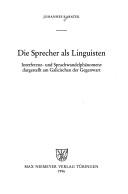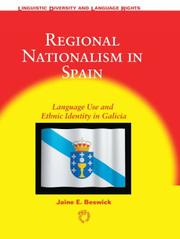| Listing 1 - 10 of 10 |
Sort by
|
Book
Year: 1935 Publisher: Barcelona : Casa Editorial Alberto Martin,
Abstract | Keywords | Export | Availability | Bookmark
 Loading...
Loading...Choose an application
- Reference Manager
- EndNote
- RefWorks (Direct export to RefWorks)
Book
ISBN: 8487847072 Year: 1991 Publisher: Santiago de Compostela : Laiovento,
Abstract | Keywords | Export | Availability | Bookmark
 Loading...
Loading...Choose an application
- Reference Manager
- EndNote
- RefWorks (Direct export to RefWorks)
Dissertation
Year: 1986 Publisher: Groningen : Regenboog,
Abstract | Keywords | Export | Availability | Bookmark
 Loading...
Loading...Choose an application
- Reference Manager
- EndNote
- RefWorks (Direct export to RefWorks)
Book
Year: 1979 Publisher: Imola : Galeati,
Abstract | Keywords | Export | Availability | Bookmark
 Loading...
Loading...Choose an application
- Reference Manager
- EndNote
- RefWorks (Direct export to RefWorks)
This is the first comprehensive attempt to provide a complete and up-to-date bibliography of dictionaries of spanish in its various European and non-European regional forms. More than 3500 dictionaries, vocabularies and glossaries are listed with full bibliographical details. Not only works of a general linguistic-literary nature but also those dealing with specialist fields and scientific and technical registers have been included. Designed for easy consultation following scientifically functional criteria, the work is divided into 5 main parts respectively dealing with Catalan, Galician, Spanish, Spanish in Latin America, and Spanish in the Philippines and surrounding areas. An appendix deals with Basque dictionaries. Each part is subdivided into sections on monolingual, bilingual and polyglot sources, and these sections are in turn divided according to terminological specialisation. The part dealing with Latin America moreover allows easy reference through the intricate web of Amerinidian languages. Each part concludes with analytical indices by author, language and subject (the latter of which provide a particularly rich and detailed breakdown by specialised field). These make for easy access to single entries in the vast quantity of material covered.
Basque (langue) --- Espagnol (langue) --- Catalan (langue) --- Galicien (langue) --- Dictionnaires basques --- Dictionnaires espagnols --- Dictionnaires catalans --- Dictionnaires galiciens
Book
ISBN: 9789027210937 Year: 2022 Publisher: Amsterdam ; Philadelphia : John Benjamins Publishing Company,
Abstract | Keywords | Export | Availability | Bookmark
 Loading...
Loading...Choose an application
- Reference Manager
- EndNote
- RefWorks (Direct export to RefWorks)
This is the first generative-oriented volume ever published about Asturian and Asturian Galician, two Romance languages which, along with their intrinsic interest, are crucial to understand the parametric distance between Spanish and Galician/Portuguese. Its chapters offer new insights about old puzzles, like pronominal enclisis or apparent violations of bans on clitic combinatorics, but they also explore less explored grounds, like aspect, negation or prosody. Chapters make special emphasis on how the concerned issues result from complex interactions between syntax proper and its interfaces with sound and meaning. The book focuses on particular aspects of Asturian and Asturian Galician, as well as on some effects of their contact with Spanish in their corresponding locations.
Bable dialect --- Galician language --- Languages in contact. --- Asturo-léonais (langue) --- Galicien (langue) --- Langues en contact --- Syntax. --- Phonology.
Book
ISBN: 9789027211422 9027211426 9027257582 Year: 2022 Publisher: Amsterdam: Philadelphia: John Benjamins,
Abstract | Keywords | Export | Availability | Bookmark
 Loading...
Loading...Choose an application
- Reference Manager
- EndNote
- RefWorks (Direct export to RefWorks)
"The reflexive constructions that are the focus of this book are the constructions broadly described with the term "middle": i.e., those that can appear in all persons, and in which the reflexive marker (RM) cannot be understood as a full referential pronoun. One goal of this study is to provide a corpus-based typology of middle and related uses that allow us to compare the behaviour of the RM in these constructions with previous typological accounts, where competing models (based either on changes of diathesis or on the semantics of the verbal event) can be found. A second goal is to shed light on the evolution of the different functions of the RM, by exploring the factors that affect its productivity, with a specific focus on those verbs where reflexive marking is most variable, that is, anticausative verbs and verbs with no change of valency. Spanish and Galician, though closely-related and neighbouring languages, show rather different productivity in terms of these reflexive constructions and are thus good candidates for a contrastive and variationist analysis serving these two goals. The semantic class of the predicate, its aspectual properties and the animacy of the subject are some of the most relevant factors that are taken into account to understand the motivations behind the presence (or absence) of the RM. By relying on a corpus of interviews from rural communities across peninsular Spain (except Catalonia), space as a relevant extra-linguistic variable is taken into account, helping uncover previously unknown geographical patterns"--
Spanish language --- Galician language --- Grammar, Comparative and general --- Espagnol (langue) --- Galicien (langue) --- Voix moyenne (linguistique) --- Voice. --- Verb. --- Reflexives. --- Middle voice. --- Grammar, Comparative --- Galician. --- Spanish. --- Grammaire comparée --- Grammaire comparée

ISBN: 3484522763 3110930978 9783484522763 Year: 1996 Volume: 276 Publisher: Tübingen: Niemeyer,
Abstract | Keywords | Export | Availability | Bookmark
 Loading...
Loading...Choose an application
- Reference Manager
- EndNote
- RefWorks (Direct export to RefWorks)
Im Zuge der Emanzipation der regionalen Sprachen im postfranquistischen Spanien wurde das Galicische zur kooffiziellen Landessprache im Nordwesten der Iberischen Halbinsel, ohne allerdings auf eine ausreichende gemeinsprachliche Tradition aufbauen zu können. Durch den neuen Status entstanden zahlreiche Ausdrucksnotwendigkeiten vor allem im Bereich konzeptioneller Schriftlichkeit, wobei die allgegenwärtige, eng verwandte Kontaktsprache Spanisch stets als Modell zur Verfügung stand und zur Quelle zahlreicher Interferenzen wurde, nicht zuletzt auch deshalb, weil ein beträchtlicher Teil der Sprecher des 'neuen Galicisch' aus den spanischsprachigen Schichten stammt. Auf der Basis von 30 Intensivinterviews mit Sprechern, die an der Schaffung des 'neuen Galicisch' mit beteiligt sind (Radio- und Fernsehsprecher, Sprachlehrer, Sprachwissenschaftler), werden die Strategien sprachlicher Emanzipation, die sich vor allem in der Übertragung und Ablehnung von Elementen aus der Kontaktsprache zeigen, anhand der Sprache der Informanten und in bezug auf ihre metasprachlichen Bewertungen untersucht. Es werden lexikalische, morphosyntaktische und phonetische Elemente untersucht, wobei letztere mit Hilfe einer apparativen kontrastiven Analyse der galicischen und spanischen Vokale betrachtet werden. Die Arbeit ist dabei einerseits ein Beitrag zur Kenntnis des Galicischen der Gegenwart, versteht sich aber gleichzeitig als Beitrag zur Interferenzforschung und zur Theoriediskussion im Bereich der sprachlichen Dynamik.
Portuguese language --- Historical linguistics --- Dialectology --- Galician language --- Interference (Linguistics) --- Languages in contact --- Interférence (Linguistique) --- Spoken Galician. --- -Interference (Linguistics) --- -Areal linguistics --- Linguistic interference --- Bilingualism --- Language transfer (Language learning) --- Galego language --- Gallegan dialect --- Romance languages --- Spoken Galician --- -Spoken Galician --- Interference (Linguistics). --- -Linguistic interference --- Interférence (Linguistique) --- Areal linguistics --- Galician language - Spoken Galician. --- Languages in contact - Spain - Galicia (Region) --- GALICIEN (LANGUE) --- INTERFERENCES LINGUISTIQUES

ISBN: 1280935057 9786610935055 1853599816 9781853599811 9781853599804 1853599808 9781853599798 1853599794 661093505X 9781280935053 Year: 2007 Publisher: Clevedon Buffalo Toronto : Multilingual Matters,
Abstract | Keywords | Export | Availability | Bookmark
 Loading...
Loading...Choose an application
- Reference Manager
- EndNote
- RefWorks (Direct export to RefWorks)
This highly accessible book examines linguistic diversity in Galicia, one of the devolved regions of Spain. Its principal hypotheses are: that the Galician language is an intrinsic characteristic of Galician ethnic identity: that policy and planning impact on the behavioural practices of language users, reflected in loyalty and prestige factors: that whilst a reversal in traditional perceptions and attitudes is resulting in a reaffirmation of Galician as the autochthonous language, its sociolinguistic relationship with Castilian has not been resolved: that Galicians have to negotiate multiple identities, subject to constant change and adjustment. Through its innovative and in-depth analysis of Galician linguistic, sociolinguistic, ethnic and cultural revival and revitalisation processes, it also serves to emphasise the wider relevance of such studies to the case of minoritised languages in general.
Sociolinguistics --- Ethnicity --- Galician language --- Nationalism --- Ethnic identity --- Group identity --- Cultural fusion --- Multiculturalism --- Cultural pluralism --- Language and languages --- Language and society --- Society and language --- Sociology of language --- Language and culture --- Linguistics --- Sociology --- Integrational linguistics (Oxford school) --- History. --- Social aspects --- Sociological aspects --- Sociolinguistique --- Galicien (Langue) --- Nationalisme --- Espagne --- Galice (Espagne) --- Histoire
Periodical
ISSN: 22555218 15799425 Publisher: Iberoamericana Editorial Vervuert
Abstract | Keywords | Export | Availability | Bookmark
 Loading...
Loading...Choose an application
- Reference Manager
- EndNote
- RefWorks (Direct export to RefWorks)
RILI (Revista Internacional de Lingüística Iberoamericana) is a journal specialized in linguistics jointly published by Iberoamericana Editorial Vervuert, the Ibero-American Institute of Bremen University and the Ibero-American Institute of Berlin. RILI appears twice a year (every six months) and includes: • Sección temática (thematic section) • Sección general (general section, with contributions by important specialists) • Reviews.
Spanish language --- Portuguese language --- Catalan language --- Galician language --- Espagnol (Langue) --- Portugais (Langue) --- Catalan (Langue) --- Galicien (Langue) --- Spaans. --- Portugees. --- Taalverandering. --- Social aspects --- Bibliography --- Aspect social --- Latin America --- Amérique latine --- Civilization --- Civilisation --- Castilian language --- Romance languages --- Galego language --- Gallegan dialect --- Civilization. --- Social aspects. --- Latin America. --- Barbarism --- Auxiliary sciences of history --- Culture --- Asociación Latinoamericana de Libre Comercio countries --- Neotropical region --- Neotropics --- New World tropics --- Spanish America --- Spanish language. --- Bibliographie
Book
ISBN: 9782503504704 2503504701 Year: 2013 Volume: 12 Publisher: Turnhout: Brepols,
Abstract | Keywords | Export | Availability | Bookmark
 Loading...
Loading...Choose an application
- Reference Manager
- EndNote
- RefWorks (Direct export to RefWorks)
Avant 1500 --- 091:860 --- 869.0 --- 091 =60 --- 091 =690 --- Handschriftenkunde. Handschriftencatalogi-:-Spaanse literatuur --- Portugese literatuur --- Handschriftenkunde. Handschriftencatalogi--Spaans --- Handschriftenkunde. Handschriftencatalogi--Portugees --- Language Spanish language variations --- Portugees. --- Dialecten. --- Iberisch schiereiland. --- 091 =690 Handschriftenkunde. Handschriftencatalogi--Portugees --- 091 =60 Handschriftenkunde. Handschriftencatalogi--Spaans --- 869.0 Portugese literatuur --- 091:860 Handschriftenkunde. Handschriftencatalogi-:-Spaanse literatuur --- 467 --- Middeleeuwen. --- Spaans. --- Spanish language --- Portuguese language --- Espagnol (Langue) --- Portugais (Langue) --- History --- To 1500 --- Dialects --- Spanish literature --- History and criticism --- Portuguese literature --- Galician language --- Iberian peninsula --- Languages --- Texts --- Espagnol (langue) --- Galicien (langue) --- Portugais (langue) --- Littérature espagnole --- Littérature portugaise --- Dialectes
| Listing 1 - 10 of 10 |
Sort by
|

 Search
Search Feedback
Feedback About UniCat
About UniCat  Help
Help News
News